定语从句关系词表格
- 格式:docx
- 大小:11.86 KB
- 文档页数:1
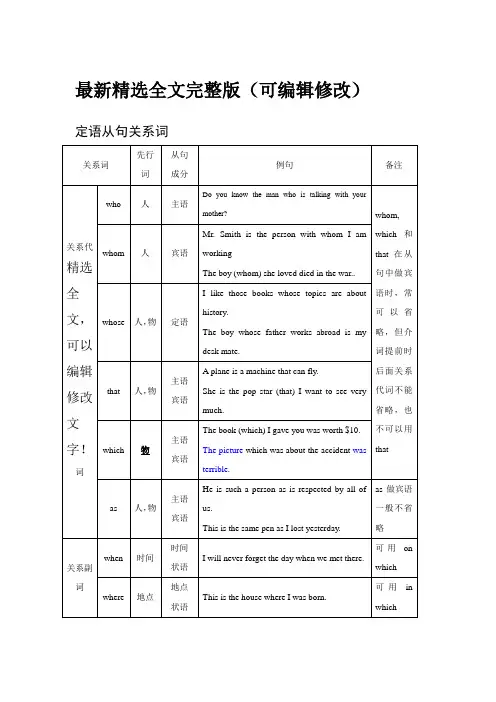

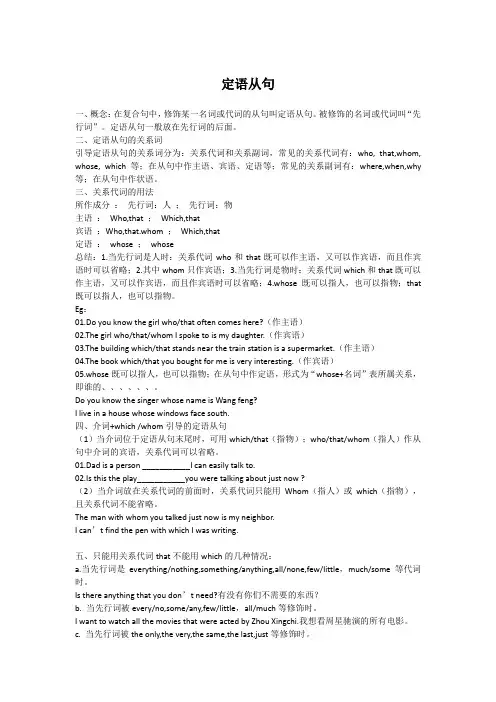
定语从句一、概念:在复合句中,修饰某一名词或代词的从句叫定语从句。
被修饰的名词或代词叫“先行词”。
定语从句一般放在先行词的后面。
二、定语从句的关系词引导定语从句的关系词分为:关系代词和关系副词,常见的关系代词有:who, that,whom, whose, which等;在从句中作主语、宾语、定语等;常见的关系副词有:where,when,why 等;在从句中作状语。
三、关系代词的用法所作成分:先行词:人;先行词:物主语:Who,that ;Which,that宾语:Who,that.whom ;Which,that定语:whose ;whose总结:1.当先行词是人时:关系代词who和that既可以作主语,又可以作宾语,而且作宾语时可以省略;2.其中whom只作宾语;3.当先行词是物时:关系代词which和that既可以作主语,又可以作宾语,而且作宾语时可以省略;4.whose既可以指人,也可以指物;that 既可以指人,也可以指物。
Eg:01.Do you know the girl who/that often comes here?(作主语)02.The girl who/that/whom I spoke to is my daughter.(作宾语)03.The building which/that stands near the train station is a supermarket.(作主语)04.The book which/that you bought for me is very interesting.(作宾语)05.whose既可以指人,也可以指物;在从句中作定语,形式为“whose+名词”表所属关系,即谁的、、、、、、。
Do you know the singer whose name is Wang feng?I live in a house whose windows face south.四、介词+which /whom引导的定语从句(1)当介词位于定语从句末尾时,可用which/that(指物);who/that/whom(指人)作从句中介词的宾语,关系代词可以省略。
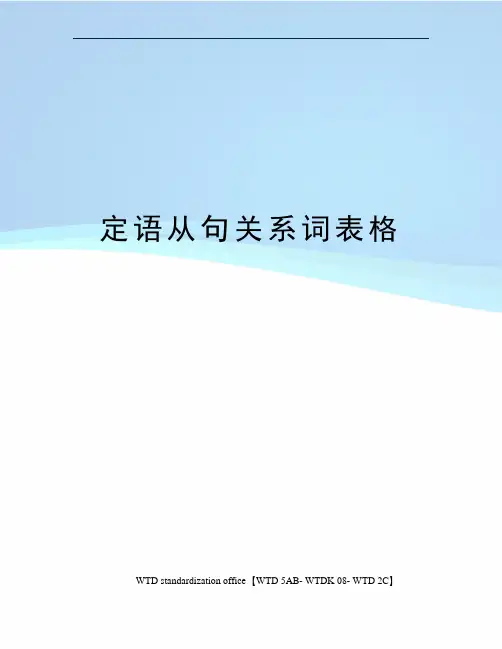
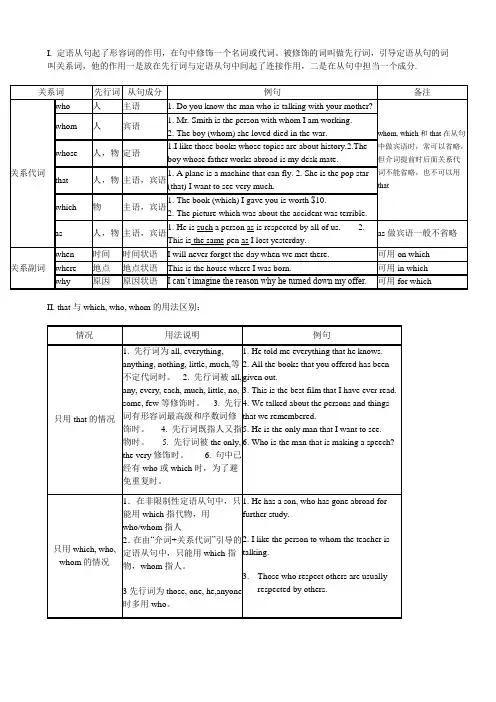
I. 定语从句起了形容词的作用,在句中修饰一个名词或代词。
被修饰的词叫做先行词,引导定语从句的词叫关系词,他的作用一是放在先行词与定语从句中间起了连接作用,二是在从句中担当一个成分.II. that与which, who, whom的用法区别:1.The place ____interested me most was the Children's Palace.A. Which B. where C. what D. in which2.Do you know the man _______? A. whom I spoke B. to who spoke C. I spoke to D. that I spoke3.This is the hotel _______last month.A. which they stayedB. at that they stayedC. where they stayed atD. where they stayed4.Do you know the year ______the Chinese Communist Party was founded?A.which B. that C.when D on which5.That is the day ______I'll never forget. A. which B. on which C. in which D. when6.The factory ______we'll visit next week is not far from here.A. whereB. to whichC. whichD. in which7.Great changes have taken place since then in the factory___we are working.A. where B. that C.which D. there8.This is one of the best films _______.A. that have been shown this yearB. that have shownC. that has been shown this yearD. that you talked9.Can you lend me the book ______the other day?A. about which you talkedB. which you talkedC. about that you talkedD. that you talked10.The pen ______he is writing is mine. A. with which B. in which C. on which D. by which11.They arrived at a farmhouse, in front of ___sat a small boy. A. whom B. who C. which D. that12.The engineer ______my father works is about 50 years old.A. to whomB. on whomC. with whichD. with whom13.It there anyone in your class ______family is in the country? A. who B. who's C. which D. whose14.I'm interested in ______you have said. A. all that B. all what C. that D. which15.I want to use the same dictionary ______was used yesterday. A. which B. who C. what D. as16.He isn't such a man ______he used to be. A. who B. whom C. that D. as17.He is good at English, ______we all know. A. that B. as C. whom D. what18.Li Ming, ______to the concert enjoyed it very much.A. I went withB. with whom I wentC. with who I wentD.I went with him20.He talked a lot about things and persons __they remembered in the school.A which B. that C. whom D. what21.The letter is from my sister, ______is working in Beijing. A. which B. that C. whom D. who22.In our factory there are 2,000 workers, two thirds of ____are women.A. them B. which C. whom D. who23.You're the only person ______I've ever met ______could do it. A. who;/ B./; whom C. whom;/ D./; who24.I lost a book, ______I can't remember now. A. whose title B. its title C. the title of it D. the title of thatst summer we visited the West Lake, ______Hangzhou is famous in the world.A. for whichB. for thatC. in whichD. what26.I have bought such a watch _______ was advertised on TV. A. that B. which C. as D. it27.I can never forget the day _______ we worked together and the day ______ we spent together.A. when; whichB. which; whenC. what; thatD. on which; when28.The way ______he looks at problems is wrong. A. which B. whose C. what D./29.This is the reason ______he didn't come to the meeting. A. in which B. with which C. that D. for which30.This machine, ______for many years, is still working perfectly.A. after which I have lookedB. which I have looked afterC. that I have looked afterD. I have looked after31.The reason ______he didn't come was ______he was ill.A. why; that B .that; why C. for that; that D.for which;what。
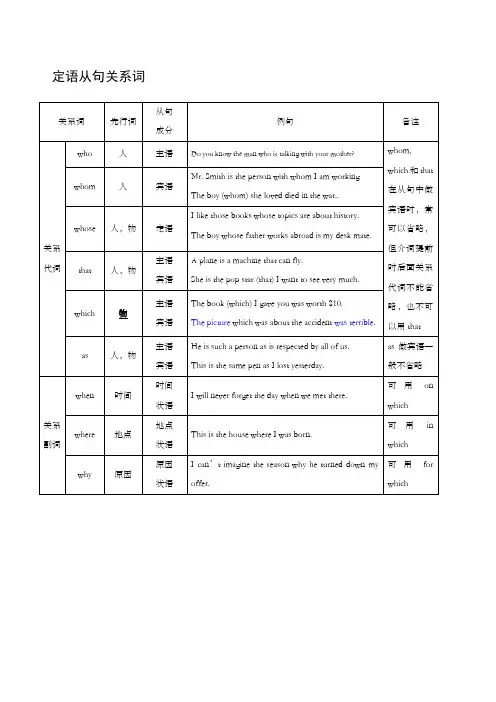
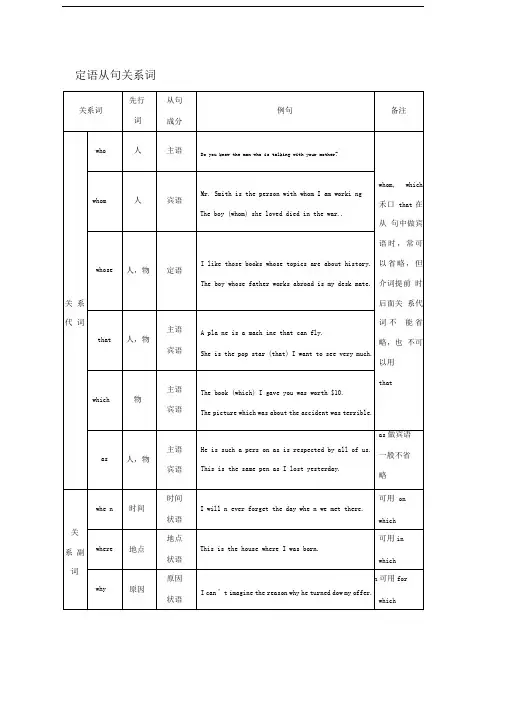
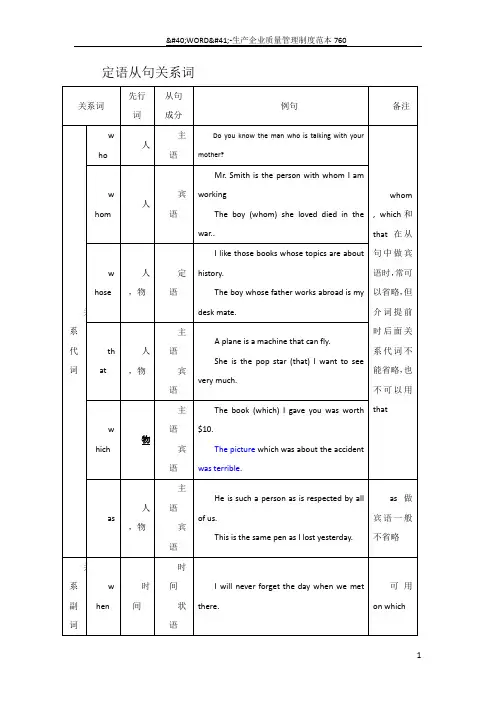
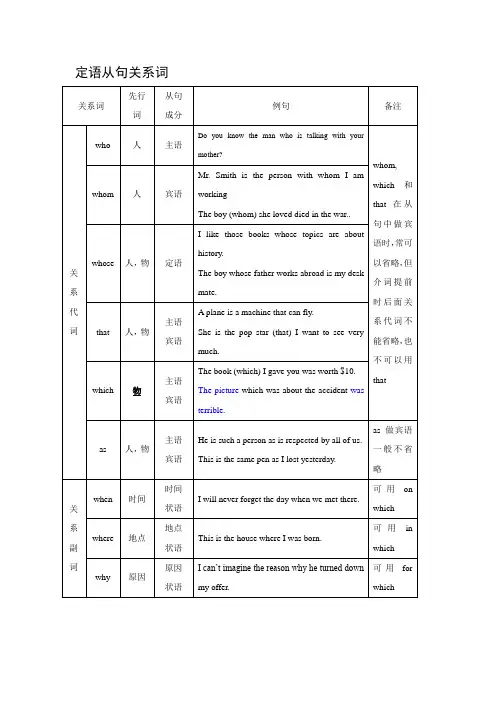
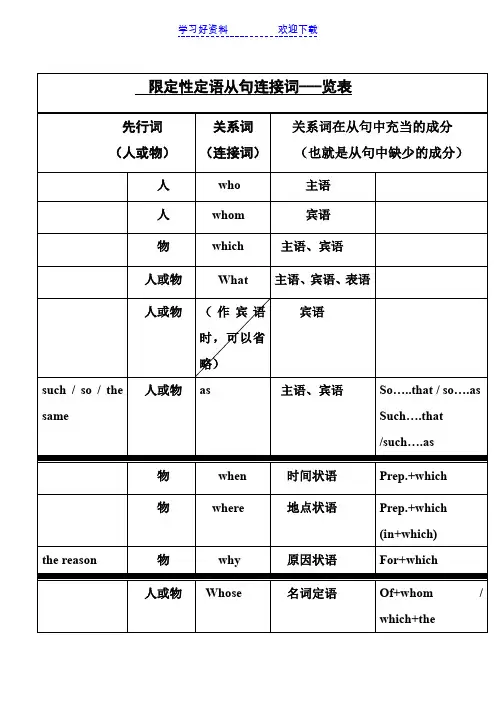

定语从句起了形容词的作用,在句中修饰一个名词或代词。
被修饰的词叫做先行词,引导定语从句的词叫关系词,他的作用一是放在先行词与定语从句中间起了连接作用,二是在从句中担当一个成分.关系词先行词从句成分例句who人主语.Doyouknowthemanwhoistalkingwithyourmot her?whom人宾语.Mr.SmithisthepersonwithwhomIamworking..Theboy(whom)sheloveddiedinthewar.whose人,物定语likethosebookswhosetopicsareaboutboywhosefatherworksabroadismydeskmate.关系代词人,物主语,宾语.Aplaneisamachinethatcanfly.2.Sheisthep opstarthat(that)Iwanttoseeverymuch.which物主语,宾语.Thebook(which)Igaveyouisworth$10..Thepicturewhichwasabouttheaccidentwast errible.as人,物主语,宾语.Heissuchapersonasisrespectedbyallofus.2.ThisisthesamepenasIlostyesterday.wh en时间时间状语Iwillneverforgetthedaywhenwemetthere.关系副词where地点地点状语ThisisthehousewhereIwasborn. why原因原因状语Ican’timaginethereasonwhyheturneddownmyoffer.备注whom,which和that在从句中做宾语时,常可以省略,但介词提前时后面关系代词不能省略,也不可以用thatas做宾语一般不省略可用onwhich可用inwhich可用forwhich II.that与which,who,whom 的用法区别:情况只用that的情况用法说明例句1.先行词为all,everything,1.Hetoldmeeverythingthatheknows.anything,nothing,little,much,等2.Allthebooksthatyouofferedhasbeen不定代词时。
当使用定语从句时,关系词(也称为关系代词或关系副词)用于引导从句,并将其与主句中的名词或代词关联起来。
以下是一些常见的关系词及其在定语从句中的用法和功能:
逗号。
以下是一些示例:
The book that is on the table is mine. (限定性定语从句,关系代词)
John, who is my friend, likes to play basketball. (非限定性定语从句,关系代词)
I visited the city where I was born. (限定性定语从句,关系副词)
The reason why he quit his job is still unknown. (限定性定语从句,关系副词)
The house, which was built in 1902, is now a museum. (非限定性定语从句,关系代词)
这些关系词和用法可以帮助你构建准确和流畅的定语从句。
记住,在选择关系词时,要根据先行词的性质和从句中的功能来确定适当的关系词。